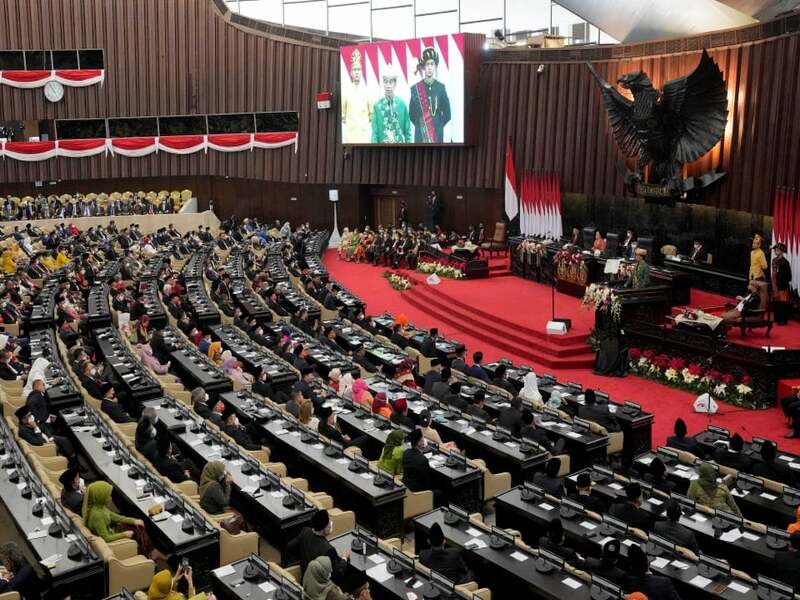
Independent Report – Predictions for Indonesia’s Political Economy in 2025, in 2025, Indonesia is likely to once again attract global attention. However, this will not be due to groundbreaking solutions to the country’s long-standing issues. Instead, the attention will stem from its ability to maintain a status quo full of paradoxes. Despite ongoing challenges, Indonesia will continue to navigate a complex political and economic landscape that may appear stable on the surface, but still reveals deep-seated issues beneath.
While Indonesia’s economy may continue to show growth, this progress will remain trapped in a safe zone—one that may be adequate to feed the egos of political elites but falls short of creating any meaningful change. Despite predictions of economic growth, the country will continue to face challenges that hinder significant transformation. The government may praise itself for achieving modest economic expansion, but the reality will be that the growth is not equally distributed and does not reflect deep, structural improvements.
By the predictions of 2025, the competition for economic dominance will intensify, but this period will still be marked by ongoing political intrigue and power struggles, with no clear resolution in sight. Whether 2025 will be the year of Indonesia’s economic resurgence remains uncertain. If anything, the country’s path forward may resemble a “zombie awakening,” where the appearance of vitality hides a deeper stagnation.
Also Read : Issue of Major Teddy Saluting Aguan, Palace Provides Official Clarification
When considering Indonesia’s economy, officials will likely boast about achieving a growth rate around 5.5%, as projected by Statistics Indonesia. However, this number will only tell part of the story. Economic growth without significant efforts toward equitable distribution will feel like a balloon expanding only to leave empty space inside. While the country’s GDP may rise, many will not feel the benefits as the gap between the rich and the poor continues to widen.
In 2025, Indonesia’s economic foundation will still rely heavily on domestic consumption, which remains vulnerable to fluctuations in prices and inflation. This reliance on consumption as the main engine of growth leaves the economy susceptible to external shocks and fluctuations in global markets. Meanwhile, the manufacturing sector, which could play a pivotal role in diversifying the economy, will continue to be sidelined and overlooked. Despite being an essential part of any robust economy, manufacturing will struggle to gain the attention and investment it deserves.
Furthermore, Indonesia’s economic policy will remain deeply tied to traditional sectors such as energy commodities, including oil and coal. These sectors will continue to enjoy favorable policies that benefit large corporations while neglecting the need for environmental sustainability. The government’s promises of a “green agenda” and “digital transformation” will, unfortunately, remain mostly theoretical, with little concrete action to balance economic growth with environmental preservation.
At present, Indonesia ranks as the sixth-largest emitter of carbon dioxide in the world. This situation will not likely change in the near future. The political and business elites will continue to prioritize short-term profits, disregarding the long-term environmental consequences for the sake of expediency. Indonesia’s industrial giants, responsible for the bulk of emissions, will remain largely unaccountable, and policies that address climate change will continue to lack enforcement or real impact.
In 2025, despite the global call for a shift towards more sustainable practices, Indonesia’s reliance on fossil fuels and extractive industries will persist. The government’s enthusiasm for transforming the digital economy will not be enough to offset the structural dependence on energy-intensive industries. These sectors will continue to receive subsidies and favorable treatment, further entrenching the country’s dependence on unsustainable growth models.
While it’s true that Indonesia’s political leaders often talk about a future driven by green energy and technological advancement, the reality on the ground will be different. The government will be more concerned with maintaining the status quo, which disproportionately benefits powerful businesses and their political allies. Efforts to address environmental damage caused by industries like mining and oil extraction will remain insufficient and poorly implemented.
In conclusion, Indonesia’s economy in 2025 will likely experience growth, but the benefits will remain concentrated in the hands of the few, while the majority of the population struggles to see tangible improvements. The country will continue to face deep political challenges, with power plays and corruption acting as significant obstacles to progress. Without meaningful reforms, Indonesia will continue to face contradictions on its path forward, where economic success will not translate into real social change or environmental responsibility.
Also Read : Pancakes: Healthy & Delicious at Le Stanze Bistrot Cafe